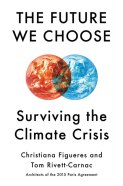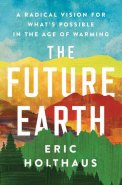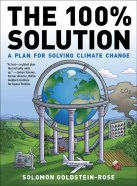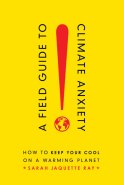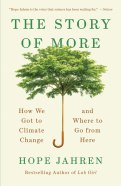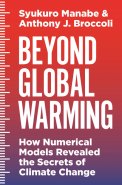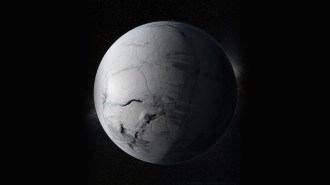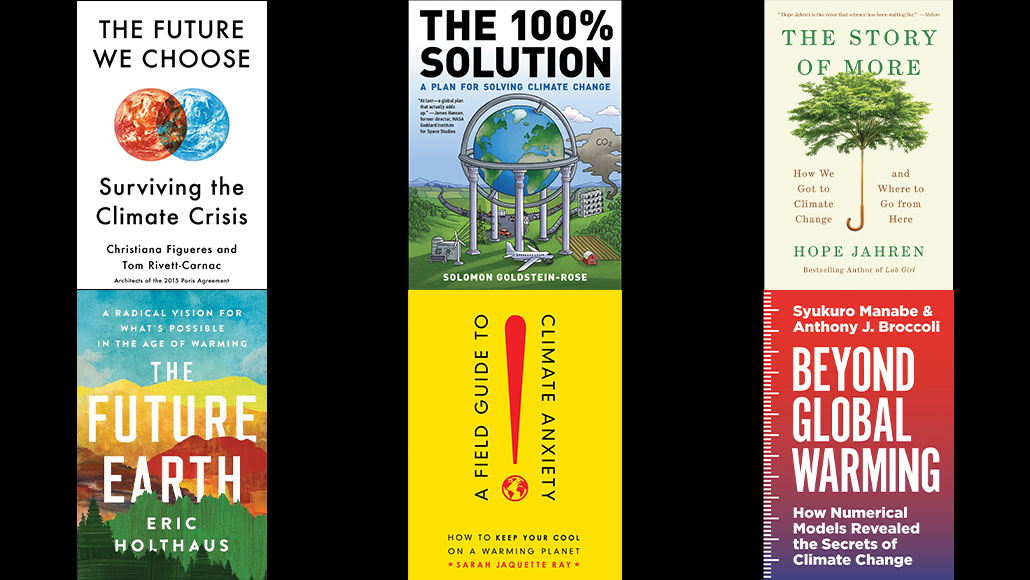
Recent books about climate change tackle science and offer visions of the future.
Climate change is increasingly becoming part of everyday conversations. For those who want to join the discussions, there is no shortage of books that give detailed background and context on the subject. The question is, which to read?
Science News staff members have reviewed several books published this year to guide you to which ones you might like. Many of these offerings address perhaps the most pressing question: With limited time to act, what’s the best way to reduce greenhouse gas emissions to avert the most dire impacts of climate change?
The Future We Choose
Christiana Figueres and Tom Rivett-Carnac
Knopf, $23
Four and a half years after 195 nations agreed to limit global warming by 2100 to 2 degrees Celsius, the world has fallen behind on its commitments (SN: 11/26/19). But all is not yet lost, two architects of the 2015 Paris Agreement argue in this bracing call to arms aimed at those who fear it’s too late. Christiana Figueres and Tom Rivett-Carnac paint two side-by-side visions of the world in 2050: a hot, pollution-choked hellscape rife with water wars and nationalist paranoia, and a hopeful, forested world of high-speed trains, energy efficiency and community-based agriculture.
Achieving that second future requires a mind-set shift away from pessimism and the idea of resource availability as a zero-sum game, Figueres and Rivett-Carnac say. They offer 10 general actions for readers to take, including avoiding fossil fuels and engaging in politics. The final chapter provides a template for actions readers can take today, this week and all the way out to 2050.
The Future Earth
Eric Holthaus
HarperOne, $22.99
In this imagined history of the next 30 years, meteorologist Eric Holthaus plots a path toward zero carbon emissions (SN: 1/31/20). We won’t get there with solar panels and electric vehicles alone, he says, criticizing those as market-based mechanisms that reinforce the status quo. Instead, success requires a political and economic revolution. Holthaus imagines natural disasters as catalysts for collective action, global systems for climate migration and reparations, and economies driven by human need rather than want.
Critics have long dismissed such a vision, arguing that it would upend society, cost too much and require an ambitious global agreement that seems politically impossible. But those arguments ignore the fact that doing nothing to address climate change will be even costlier and more politically damaging down the road, Holthaus says. (And those criticisms may be crumbling now as the coronavirus pandemic shows societies engaged in expensive and disruptive collective action for the public good.)
The book ends with a series of tips, exercises and checklists to help readers imagine this new future and create their own action plans.
The 100% Solution
Solomon Goldstein-Rose
Melville House, $17.99
After running a campaign focused on climate change, Solomon Goldstein-Rose was elected to the Massachusetts Legislature in 2016 at the age of 22. He served one term and then turned to climate activism full time. In this concise book, he draws on his experiences to draft a five-pillar framework for reaching negative carbon emissions by 2050.
Because most new emissions come from rapidly developing countries, solutions must be economically viable for everyone, Goldstein-Rose points out. He argues that a “World War II–style mobilization” of technology development can get us there. Central to his plans, which he claims are feasible to achieve in the next 30 years, are scaling up nuclear power, improving battery storage and rolling out “greener” industrial processes.
A Field Guide to Climate Anxiety
Sarah Jaquette Ray
Univ. of California, $16.95
If thinking about climate change makes you (a) depressed, (b) worried, (c) guilty or (d) all of the above, this book might be for you. Drawing on her expertise as an environmental humanities scholar, Sarah Jaquette Ray outlines how environmentally conscious citizens can cultivate a healthy mind-set and strong interpersonal relationships for taking action on climate change.
To deal with climate change–related fear and sadness, she suggests mindfulness practices. To avoid burnout, she advocates setting attainable goals, like reducing personal emissions or collaborating on environmental projects with local community members.
Emotional intelligence is important for engaging with other people’s feelings about climate change, too. Ray reminds readers that people react to information based more on how they feel about the messenger than the message. So prioritize building trust and common ground — perhaps by focusing on local issues or framing climate change as a public health problem — over simply winning debates with skeptics.
The Story of More
Hope Jahren
Vintage, $15
Paleobiologist Hope Jahren’s succinct examination of “how we got to climate change” is both sweeping and straightforward. Ranging across human history, and everywhere from Mesopotamia to Minnesota, the book explores how the same ingenuity and industrious spark that has allowed humans to squeeze ever more food and energy from the Earth also set the stage for the current climate crisis.
Jahren relays the enormous scale of human consumption conversationally: “Since 1969 the nations of the globe have burned enough coal to fill a grave the size of Texas.” But she’s frank about who exactly is responsible for the lion’s share of this consumption and its consequences. Again and again, she ties the developed world’s insatiable thirst for more to our imperiled planet.
The end of the book touches on several big interventions that might curb climate change, such as mass tree planting or geoengineering, but Jahren argues these won’t fix the root cause of climate change: overconsumption. So she offers practical actions individuals can take that all fall under the umbrella of using less and sharing more.
Beyond Global Warming
Syukuro Manabe and Anthony J. Broccoli
Princeton Univ., $35
In 1894, Swedish scientist Svante Arrhenius made a startling announcement. His calculations suggested that a two- or threefold increase in atmospheric carbon dioxide could alter global temperatures on a scale comparable to the difference between cold glacial and warm interglacial periods.
Climate scientists have since devised increasingly complex models to understand humans’ impact on climate, weaving together observations and equations to simulate changes on land, in the oceans and in the atmosphere (SN: 1/7/20). Climate modeler Syukuro Manabe and atmospheric scientist Anthony J. Broccoli describe the evolution of these models.
Packed with data and graphs, and based on a graduate course taught by Manabe, the book is not a light read. But it gives an in-depth, science-rich understanding of this crucial field.
Click the book titles or covers to buy from Amazon.com. Science News is a participant in the Amazon Services LLC Associates Program. Please see our FAQ for more details.
